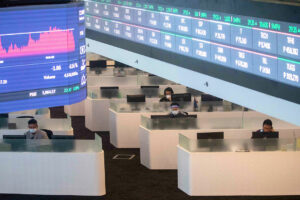By Beatriz Marie D. Cruz, Reporter
A PROPOSAL to lower taxes on stock collections is expected to increase trading activity and even attract more foreign investors, stock market analysts said at the weekend.
“The proposed House bill strikes a good balance between supporting the stock market and maintaining an appropriate fiscal position,” China Bank Capital Corp. Managing Director Juan Paolo E. Colet said in a Viber message.
“The reduction in friction costs would create opportunities for active investors to tighten bid-ask spreads and add market liquidity,” he added, noting that the measure would boost the appeal of real estate investment trusts and other dividend stocks to foreign individual investors.
House Bill No. 8958 or the proposed Capital Markets Efficiency Promotion Act, seeks to reduce taxes on stock transactions from 0.6% to 0.1% of the value of the stock, and dividends to non-resident foreigners from 25% to 10%.
It also imposes a tax on debt instruments of 0.1%, at par with the reduced rate for stock transactions.
Albay Rep. Jose Ma. Clemente S. Salceda said the Palace and other agencies have been pushing for measures to improve the “overall liquidity of the Philippine Stock Exchange (PSE).”
“(This tax reform) can be simpler and faster than the Passive Income and Financial Intermediaries Taxation Act or PIFITA, which might be too comprehensive and broad-ranging that time might not be on our side,” he said in a statement last week.
Globalinks Securities and Stocks, Inc. Head of Sales Trading Toby Allan C. Arce said reducing the tax on stock transactions will decrease the cost of buying and selling stocks, leading to more trading activity.
“Investors might be more inclined to engage in the stock market due to the lower transaction costs. Higher trading activity can contribute to market liquidity and better price discovery,” Mr. Arce said in a Viber chat.
Unicapital Securities, Inc. Senior Equity Research Analyst Carlos Angelo O. Temporal said market activity “has remained lackluster for the past six months,” and expressed doubt about tax adjustments enhancing trading and investment.
“Given the prevailing pessimistic sentiment in the equity market stemming from various macroeconomic concerns — such as underwhelming domestic GDP figures, China’s economic deceleration, the weakening peso, heightened chances of another Fed rate hike, and emerging inflationary pressures — it’s improbable that the suggested reduction in taxes on stock transactions will substantially enhance market activity, which has remained lackluster for the past six months,” he said via Viber.
Analysts said that lowering dividends tax of non-resident foreigners will help bring in foreign investment.
“The supplementary net returns from the tax reduction could effectively amplify foreign inflows, offering a beneficial impact to the market,” Mr. Temporal said.
Mr. Arce also said that lowering the dividend tax will make the market more globally competitive.
Mr. Colet noted that reducing the dividend tax could also be problematic for the government’s fiscal position.
“It is understandably not the right time for such a cut as that would have further eroded tax revenue,” he said.
To further encourage trading activity, Mr. Colet said the PSE should prepare for short-selling as well as the development of a derivatives market.
Mr. Arce said that the government should look into financial literacy and investor education initiatives to encourage stock investment.
To make trading fair and efficient, there is also a need for the continuous improvement of trading platforms, settlement systems, and regulatory frameworks, Mr. Arce noted.
He added that improving the business environment, achieving stability in the macroeconomic environment and political stability are also prerequisites.
“A more vibrant stock market can contribute to the overall development of the financial sector. It can encourage the development of new financial products, stimulate innovation, and improve the overall efficiency of capital allocation” according to Mr. Arce.

